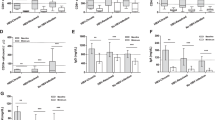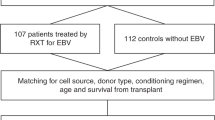Abstract
B-cell maturation antigen (BCMA)-targeted chimeric antigen receptor-T cell (CAR-T) therapy is used for refractory or relapsed multiple myeloma (r/r MM). Concern of the safety and efficacy of CAR-T cell therapy in patients with chronic or resolved HBV infection is raised. In this study, we retrospectively reviewed 99 patients with r/r MM treated with BCMA-targeted CAR-T cell therapy, of which 7 (7.1%) patients had chronic HBV infection, 43 (43.4%) with resolved HBV infection, and the remaining 49 (49.49%) HBV-uninfected. Patients’ characteristics before CAR-T cell administration were comparable in different status of HBV infection. Patients’ liver function, cytokine levels, CAR-T cell expansion and cytokine release syndrome (CRS) grade after CAR-T cell therapy did not differ in different HBV serologic status. Furthermore, chronic HBV infection or resolved HBV infection did not affect clinical response, progress-free survival (PFS), or overall survival (OS). Four (4.04%) patients experienced HBV reactivation, 3 (6.98%) with resolved HBV infection, and 1 (14.29%) chronic HBV infection. Of 4 patients with HBV reactivation, 2 cases (50%) of severe hepatitis were noted and reported. Drops of serum IgG and elevation of alanine aminotransferase (ALT), alanine aminotransferase (AST), total bilirubin (TB) were observed in all four patients around the date of HBV reactivation.
This is a preview of subscription content, access via your institution
Access options
Subscribe to this journal
Receive 12 print issues and online access
$259.00 per year
only $21.58 per issue
Buy this article
- Purchase on Springer Link
- Instant access to full article PDF
Prices may be subject to local taxes which are calculated during checkout






Similar content being viewed by others
Data availability
All data can be obtained from corresponding author for appropriate reason.
References
Zhao W-H, Wang B-Y, Chen L-J, Fu W-J, Xu J, Liu J, et al. Four-year follow-up of LCAR-B38M in relapsed or refractory multiple myeloma: a phase 1, single-arm, open-label, multicenter study in China (LEGEND-2). J Hematol Oncol. 2022;15:86.
Munshi NC, Anderson LD, Shah N, Madduri D, Berdeja J, Lonial S, et al. Idecabtagene Vicleucel in Relapsed and Refractory Multiple Myeloma. N. Engl J Med. 2021;384:705–16.
Martin T, Usmani SZ, Berdeja JG, Agha M, Cohen AD, Hari P, et al. Ciltacabtagene autoleucel, an Anti–B-cell maturation antigen chimeric antigen receptor T-cell therapy, for relapsed/refractory multiple myeloma: CARTITUDE-1 2-year follow-up. JCO. 2022;41:1265–74.
Hoofnagle JH. Reactivation of hepatitis B. Hepatology. 2009;49:S156–165.
Lee SK, Sung PS, Park S-S, Min C-K, Nam H, Jang JW, et al. Reactivation of resolved hepatitis B after daratumumab for multiple myeloma. Clin Infect Dis. 2021;73:e1372–e1375.
Yoo S, Lee D, Shim JH, Kim KM, Lim Y-S, Lee HC, et al. Risk of hepatitis B virus reactivation in patients treated with immunotherapy for anti-cancer treatment. Clin Gastroenterol Hepatol. 2022;20:898–907.
Su Y-C, Lin P-C, Yu H-C, Wu C-C. Antiviral prophylaxis during chemotherapy or immunosuppressive drug therapy to prevent HBV reactivation in patients with resolved HBV infection: a systematic review and meta-analysis. Eur J Clin Pharm. 2018;74:1111–9.
Lee P-C, Chao Y, Chen M-H, Lan K-H, Lee I-C, Hou M-C, et al. Risk of HBV reactivation in patients with immune checkpoint inhibitor-treated unresectable hepatocellular carcinoma. J Immunother Cancer. 2020;8:e001072.
Wei J, Zhu X, Mao X, Huang L, Meng F, Zhou J. Severe early hepatitis B reactivation in a patient receiving anti-CD19 and anti-CD22 CAR T cells for the treatment of diffuse large B-cell lymphoma. J Immunother Cancer. 2019;7:315.
Li P, Zhou L, Ye S, Zhang W, Wang J, Tang X, et al. Risk of HBV reactivation in patients with resolved HBV infection receiving anti-CD19 chimeric antigen receptor T cell therapy without antiviral prophylaxis. Front Immunol. 2021;12:638678.
Wang Y, Liu Y, Tan X, Pan B, Jian Ge, Qi K, et al. Safety and efficacy of chimeric antigen receptor (CAR)-T-cell therapy in persons with advanced B-cell cancers and hepatitis B virus-infection. Leukemia. 2020;34:2704–7.
Liu W, Huang W, Wang M, Lv R, Li J, Wang Y, et al. Risk of hepatitis B reactivation is controllable in patients with B‐cell lymphoma receiving anti‐CD19 CAR T cell therapy. Br J Haematol. 2020;191:126–9.
Cao W, Wei J, Wang N, Xu H, Xiao M, Huang L, et al. Entecavir prophylaxis for hepatitis B virus reactivation in patients with CAR T-cell therapy. Blood. 2020;136:516–9.
Zhang M, Zhou L, Zhao H, Zhang Y, Wei G, Hong R, et al. Risk factors associated with durable progression-free survival in patients with relapsed or refractory multiple myeloma treated with anti-BCMA CAR T-cell therapy. Clin Cancer Res. 2021;27:6384–92.
Lee DW, Santomasso BD, Locke FL, Ghobadi A, Turtle CJ, Brudno JN, et al. ASTCT consensus grading for cytokine release syndrome and neurologic toxicity associated with immune effector cells. Biol Blood Marrow Transpl. 2019;25:625–38.
Palumbo A, Avet-Loiseau H, Oliva S, Lokhorst HM, Goldschmidt H, Rosinol L, et al. Revised international staging system for multiple myeloma: a report from international myeloma working group. J Clin Oncol. 2015;33:2863–9.
Han L, Zhou J, Zhou K, Zhu X, Zhao L, Fang B, et al. Safety and efficacy of CAR-T cell targeting BCMA in patients with multiple myeloma coinfected with chronic hepatitis B virus. J Immunother Cancer. 2020;8:e000927.
Tsukune Y, Sasaki M, Odajima T, Sunami K, Takei T, Moriuchi Y, et al. Incidence and risk factors of hepatitis B virus reactivation in patients with multiple myeloma in an era with novel agents: a nationwide retrospective study in Japan. Blood Cancer J. 2017;7:631.
Yeo W, Chan PKS, Zhong S, Ho WM, Steinberg JL, Tam JS, et al. Frequency of hepatitis B virus reactivation in cancer patients undergoing cytotoxic chemotherapy: a prospective study of 626 patients with identification of risk factors. J Med Virol. 2000;62:299–307.
Loomba R, Liang TJ. Hepatitis B reactivation associated with immune suppressive and biological modifier therapies: current concepts, management strategies, and future directions. Gastroenterology. 2017;152:1297–309.
Topp MS, Meerten T, Houot R, Minnema MC, Bouabdallah K, Lugtenburg PJ, et al. Earlier corticosteroid use for adverse event management in patients receiving axicabtagene ciloleucel for large B‐cell lymphoma. Br J Haematol. 2021;195:388–98.
Oluwole OO, Bouabdallah K, Muñoz J, De Guibert S, Vose JM, Bartlett NL, et al. Prophylactic corticosteroid use in patients receiving axicabtagene ciloleucel for large B‐cell lymphoma. Br J Haematol. 2021;194:690–700.
Perrillo RP, Gish R, Falck-Ytter YT. American gastroenterological association institute technical review on prevention and treatment of hepatitis B virus reactivation during immunosuppressive drug therapy. Gastroenterology. 2015;148:221–.e3.
Rehermann B. Pathogenesis of chronic viral hepatitis: differential roles of T cells and NK cells. Nat Med. 2013;19:859–68.
Kusumoto S, Tanaka Y, Suzuki R, Watanabe T, Nakata M, Takasaki H, et al. Monitoring of hepatitis B virus (HBV) DNA and risk of HBV reactivation in B-cell lymphoma: a prospective observational study. Clin Infect Dis. 2015;61:719–29.
Zhang M-Y, Zhu G-Q, Shi K-Q, Zheng J-N, Cheng Z, Zou Z-L, et al. Systematic review with network meta-analysis: comparative efficacy of oral nucleos(t)ide analogues for the prevention of chemotherapy-induced hepatitis B virus reactivation. Oncotarget. 2016;7:30642–58.
Chen W-C, Cheng J-S, Chiang P-H, Tsay F-W, Chan H-H, Chang H-W, et al. A comparison of entecavir and lamivudine for the prophylaxis of hepatitis B virus reactivation in solid tumor patients undergoing systemic cytotoxic chemotherapy. PLoS ONE. 2015;10:e0131545.
Pattullo V. Prevention of hepatitis B reactivation in the setting of immunosuppression. Clin Mol Hepatol. 2016;22:219–37.
Acknowledgements
This work was supported by Zhejiang Provincial Key Medical Discipline (Medical Tissue Engineering). We sincerely thank the patient and his family for their trust and all colleagues for their efforts from the Bone Marrow Transplantation Center, The First Affiliated Hospital, School of Medicine, Zhejiang University. We sincerely thank the support from the National Natural Science Foundation of China (81730008).
Author information
Authors and Affiliations
Contributions
FS, QZ, YH and HH designed the study; FS, QZ, ZC, RJ, FN, YL, HZ and JC analyzed and interpreted the data; QZ, CZ, YH, and HH drafted the article; ZC revised the article; AHC and YZ helped manufacture of CAR-T cells; YH, MZ, GW and HH provided CAR-T cell treatment and care to patients.
Corresponding authors
Ethics declarations
Competing interests
Author YZ and AHCis employed by Shanghai YaKe Biotechnology Ltd. The remaining authors declare that the research was conducted in the absence of any commercial or financial relationships that could be construed as a potential conflict of interest.
Additional information
Publisher’s note Springer Nature remains neutral with regard to jurisdictional claims in published maps and institutional affiliations.
Rights and permissions
Springer Nature or its licensor (e.g. a society or other partner) holds exclusive rights to this article under a publishing agreement with the author(s) or other rightsholder(s); author self-archiving of the accepted manuscript version of this article is solely governed by the terms of such publishing agreement and applicable law.
About this article
Cite this article
Fu, S., Zhang, Q., Jing, R. et al. HBV reactivation in patients with chronic or resolved HBV infection following BCMA-targeted CAR-T cell therapy. Bone Marrow Transplant 58, 701–709 (2023). https://doi.org/10.1038/s41409-023-01960-2
Received:
Revised:
Accepted:
Published:
Issue Date:
DOI: https://doi.org/10.1038/s41409-023-01960-2
This article is cited by
-
Hepatitis B virus reactivation associated with CAR T-cell therapy
Holistic Integrative Oncology (2024)



